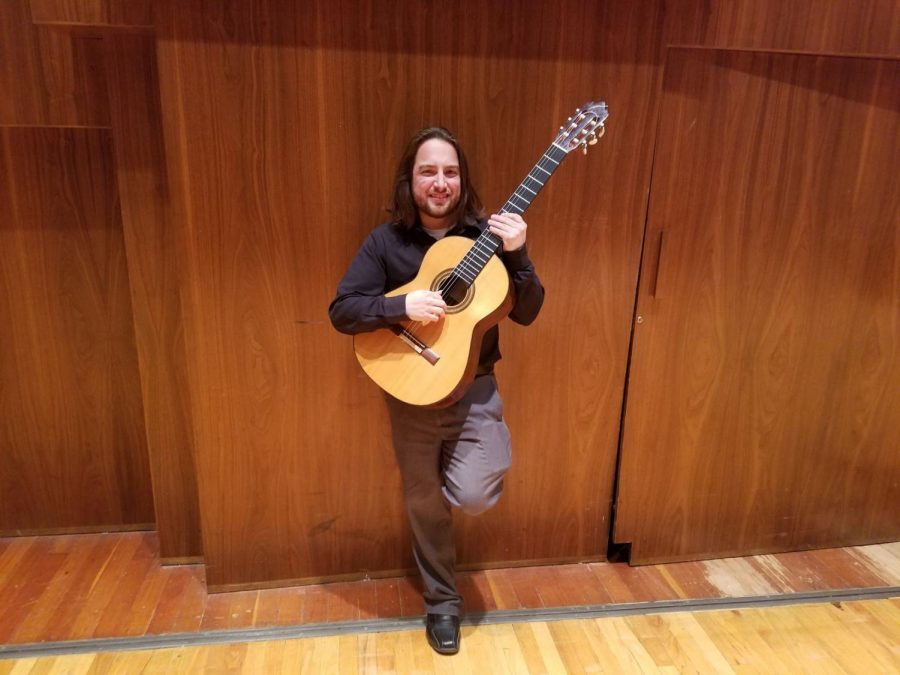Faculty members highlight Latin American music in concert
March 7, 2017
Washburn adjunct professor Brent Ferguson performed a faculty recital this past Saturday, March 4 at the White Concert Hall. Ferguson was joined by two colleagues, Dr. Genaro Mendez from Kansas University and Dr. Charles Badami from Northwest Missouri State University. Mendez and Badami, singing and accompanying with piano respectively, performed several songs during the program, while Ferguson played several solo guitar pieces. The entire repertoire of the recital was meant to highlight music from four different Latin American countries: Mexico, Brazil, Cuba and Argentina.
The concert first highlighted songs from Mexico. Ferguson approached the stage and played a guitar arrangement of Johann Sebastian Bach’s Prelude from his first cello suite. The piece was created by veteran Mexican composer Manuel Ponce. The composer wrote the piece anonymously for his friend Andres Segovia to perform.
Mendez and Badami approached the stage next to continue underlining the work of Ponce. Mendez sang several of Ponce’s classical tenor pieces. “Palomitamaya,” “A la orilla de un palmar” and “Voy a partir.” These pieces were translated by Mendez before performing to help the audience understand the meaning behind the Spanish words. “Voy a partir means ‘I am going to part,’” said Mendez. “It’s a young man saying ‘I’m going to a land unknown, but I will always remember your eyes.’”
Ferguson returned to the stage to play guitar pieces from Brazil. Ferguson played two movements from Heitor Villa-Lobos’s “Suite populaire bresilienne,” which is translated to “Suite of popular Brazilian songs.” Villa-Lobos was a street band performer who brought the popular music of his country into the concert hall, making him the George Gershwin of Brazilian street music.
The concert turned its sights to Cuba following the Brazilian segment. Mendez and Badami returned to the stage to perform Adolfo Guzman’s “No puedo ser feliz.” “The piece is a man lamenting that his loved one is so far from him. He cannot be happy because she is not near him,” Mendez said of the piece. The duo also performed “Lagrimas Negras,” from Miguel Matamoros, a piece about a man so in love he would go to the depths of hell for his love, but instead he will only cry black tears. After the two left the stage Ferguson returned to perform Leo Brouwer’s “Un dia de Noviembre,” a medley of songs from the film of the same name. “This piece was a favorite of my grandmother’s, it means quite a lot to me,” Ferguson said.
Finally, the recital ended with songs from Argentina. Dr. Badami played a fast-paced piano piece from Alberto Ginastera and was then joined by Mendez to perform a collection of five street songs from Argentina. The pieces ranged from melancholic sadness, undying love and the lustful desire of passion.
The concert ended with Ferguson playing Jose Luis Merlin’s “Suite del recuerdo.” The piece captures emotions of the Guerra Sucia or Dirty War that took place in Argentina from the 70’s to the 80’s. The first movement Ferguson played from the suite laments the innocent people who were captured by terrorist forces during the war, this includes members of Merlin’s family. The final movement, entitled “Joropo” is a celebration of the lives of those captured, commending their bravery and courage as well as their love of life despite the situation they were placed in.
“This music is not often seen in a concert setting,” Ferguson said. “We wanted to show students and faculty that highlighted the roots of the three performers, and to end the stigma around Latin American music as formal concert music.”
Ferguson teaches MU 111 “Guitar for Beginners” which is open to all students, not just music majors. “We are trying to create the guitar program here at Washburn and I would love for any student with an interest in guitar to join us and help our program grow,” Ferguson said.
The Washburn Music Department’s next event will be the Late Winter Choral Concert. The concert will begin at 7:30 pm, Monday, March 13 at the White Concert Hall. Admission is free for all attendees.



